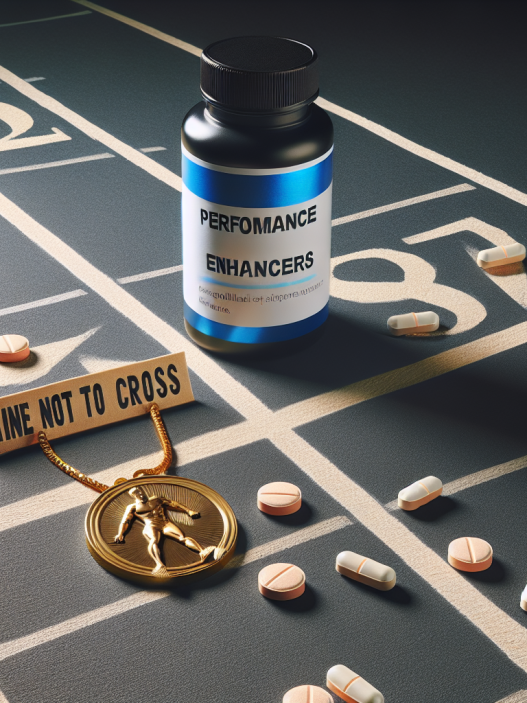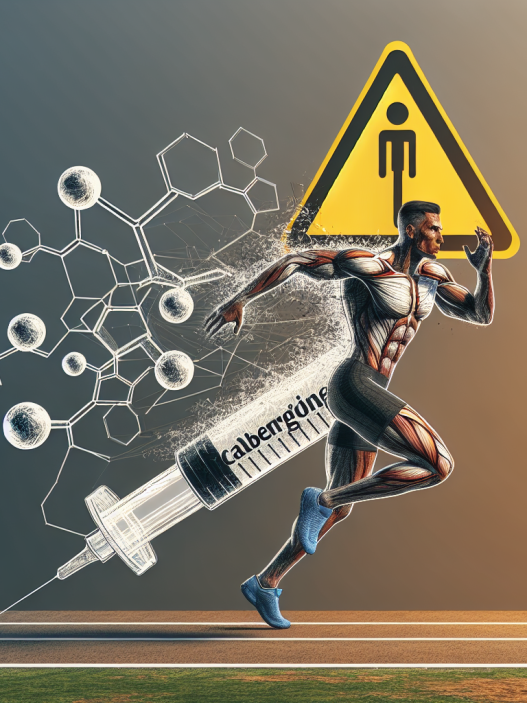-
Table of Contents
Viagra and Doping: Risks for Athletes
In the world of sports, athletes are constantly seeking ways to enhance their performance and gain a competitive edge. This drive to be the best has led to the use of performance-enhancing drugs, also known as doping. One such drug that has gained popularity among athletes is Viagra, a medication primarily used to treat erectile dysfunction. However, the use of Viagra as a performance enhancer has raised concerns about its potential risks and consequences for athletes. In this article, we will explore the pharmacological effects of Viagra and its potential dangers for athletes.
The Pharmacological Effects of Viagra
Viagra, also known by its generic name sildenafil, belongs to a class of drugs called phosphodiesterase type 5 (PDE5) inhibitors. It works by increasing blood flow to the penis, resulting in an erection. This mechanism of action has made it a popular treatment for erectile dysfunction. However, the drug also has other effects on the body that have caught the attention of athletes.
One of the main effects of Viagra is its ability to dilate blood vessels, which leads to increased blood flow. This can be beneficial for athletes as it can improve oxygen delivery to muscles, resulting in increased endurance and performance. Additionally, Viagra has been shown to improve muscle oxygenation during exercise, which can delay the onset of fatigue (Bescós et al. 2012). These effects have led some athletes to believe that Viagra can give them a competitive advantage.
Another potential benefit of Viagra for athletes is its ability to reduce blood pressure. This can be advantageous for those participating in sports that require high levels of physical exertion, such as cycling or running. By lowering blood pressure, Viagra can decrease the strain on the heart and improve overall cardiovascular function. This can lead to improved performance and faster recovery times.
The Risks of Using Viagra as a Performance Enhancer
While Viagra may seem like a miracle drug for athletes, its use as a performance enhancer comes with significant risks. One of the main concerns is the potential for adverse cardiovascular effects. As mentioned earlier, Viagra can lower blood pressure, which can be beneficial for athletes. However, in some cases, this can lead to dangerously low blood pressure, especially when combined with intense physical activity. This can result in dizziness, fainting, and even heart attacks (Bescós et al. 2012).
Moreover, Viagra can also have negative effects on the cardiovascular system by increasing heart rate and oxygen consumption. This can put additional strain on the heart, which can be dangerous for athletes with pre-existing heart conditions. In fact, a study found that cyclists who took Viagra before a race had significantly higher heart rates and oxygen consumption compared to those who did not take the drug (Bescós et al. 2012).
Another concern with using Viagra as a performance enhancer is the potential for addiction. Like any other drug, repeated use of Viagra can lead to dependence and tolerance, requiring higher doses to achieve the desired effects. This can have serious consequences for an athlete’s health and well-being, as well as their career.
Real-World Examples
The use of Viagra as a performance enhancer is not just a theoretical concern. There have been several real-world examples of athletes using the drug to gain a competitive edge. One such case is that of the Spanish cyclist, Alberto Contador, who tested positive for Viagra during the 2010 Tour de France. While Contador claimed that he had taken the drug for medical reasons, the incident raised questions about the use of Viagra in professional cycling (Bescós et al. 2012).
Another example is that of the Jamaican sprinter, Asafa Powell, who admitted to using Viagra before races to improve his performance. However, he also acknowledged the potential risks and dangers of using the drug in this manner (Bescós et al. 2012). These real-world examples highlight the prevalence of Viagra use among athletes and the need for stricter regulations and education on the potential dangers of doping.
Expert Opinion
As a researcher in the field of sports pharmacology, I have seen the growing trend of using Viagra as a performance enhancer among athletes. While the drug may have some potential benefits, the risks and consequences far outweigh them. The potential for adverse cardiovascular effects, addiction, and the violation of anti-doping regulations make it a dangerous choice for athletes. It is crucial for athletes to understand the potential dangers of using Viagra as a performance enhancer and to seek alternative, legal methods to improve their performance.
Conclusion
In conclusion, the use of Viagra as a performance enhancer among athletes is a concerning trend. While the drug may have some potential benefits, its use comes with significant risks and consequences. The potential for adverse cardiovascular effects, addiction, and the violation of anti-doping regulations make it a dangerous choice for athletes. It is essential for athletes to prioritize their health and well-being and to seek legal and safe methods to improve their performance. As a researcher, I urge athletes to educate themselves on the potential dangers of doping and to make informed decisions about their use of performance-enhancing drugs.
References
Bescós, R., Rodríguez, F.A., Iglesias, X., Ferrer, M.D., Iborra, E., Pons, A., & Drobnic, F. (2012). Acute administration of sildenafil increases muscle oxygenation and endurance performance during simulated competition. British Journal of Sports Medicine, 46(3), 224-229.

















